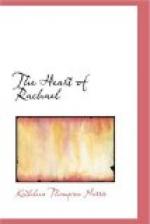A queer, hectic, unsatisfying life it must be, Rachael thought, saying good-bye to her guest a day or two later. Dressing, rouging, lacing, pinning on her outrageously expensive hats, jerking on her extravagant white gloves, drinking, rushing, screaming with laughter, screaming with anger, Billy was one of that large class of women that the big city breeds, and that cannot live elsewhere than in the big city. She would ride in a thousand taxicabs, worrying as she watched the metre; she would drink a thousand glasses of champagne, wondering anxiously if Joe were to pay for it; she would gossip of a dozen successful actresses without the self-control to work for one-tenth of their success, and she would move through all the life of the theatres and hotels without ever having her place among them, and her share of their little glory. And almost as reckless in action as she was in speech, she would cling to the brink of the conventions, never quite a good woman, never quite anything else, a fond and loyal if a foolish and selfish mother, some day noisily informing her admirers that she actually had a boy in college, and enjoying their flattering disbelief. And so would disappear the last of the handsome fortune that poor Clarence’s father had bequeathed to him, and Clarence’s grandson must fight his way with no better start than his grandfather had had financially, and with an infinitely less useful brain and less reliable pair of hands. Billy might be widowed or freed in some less unexceptionable way, and then Billy would marry again, and it would be a queer marriage; Rachael could read her fate in her character.
She wondered, walking slowly the short mile that lay between her house and the station, when Billy was gone, just how a discerning eye might read her own fate in her own character. Just what did the confused mixture of good motives and bad motives, erratic unselfishnesses and even more erratic weaknesses that was Rachael, deserve of Fate? She had bought some knowledge, but it had been dearly bought; she had bought some goodness, but at what a cost of pain!
“I don’t believe that Warren ever did one-tenth the silly things we suspected him of!” Alice exclaimed one day. “I believe he was just an utter fool, and Magsie took advantage of it!”
Rachael did not answer, but there was no brightening of her sombre look. Her eyes, grave and sad, held for Alice no hope that she had come, as George and Alice had come, to a softer view of Warren’s offence.
“I see him always as he was that last horrible morning,” she said to Alice. “And I pray that I will never look upon his face again!” And when presently Alice hinted that George was receiving an occasional letter from Warren, Rachael turned pale.
“Don’t quote it to me, Alice,” she said gently; “don’t ask me to hear it. It’s all over. I haven’t a heart any more, just a void and a pain. You only hurt me—I can’t ever be different. You and George love me, I know that. Don’t drive me away. Don’t ever feel that it will be different from what it is now. I—I wish him no ill, God knows, but—I can’t. It wouldn’t be happiness for me or for him. Please, please—!”




